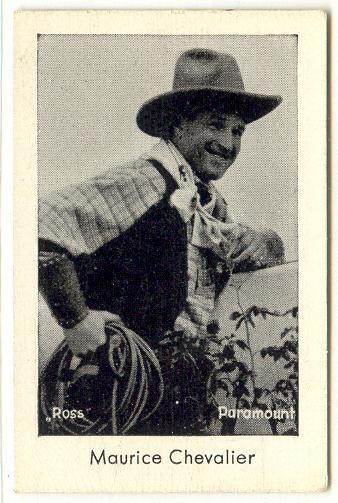
Maurice Chevalier, cowboy - 1930s original card #325
Maurice Chevalier ~ Issued by Josetti Cigarettes, circa early-1930s, card #325 of the Filmbilder series. Card is larger than a traditional British or American cigarette card but smaller than a typical modern American trading card (slightly over 1½"x2¼"). Excellent condition, see my scan.
Maurice Chevalier's first working job was as an acrobat, until a severe accident turned him toward singing and making pictures, that is, short films in France, the year being 1908. He joined the French Army in World War I, but was wounded, captured, and imprisoned by the Germans. While in prison, he learned the English language from fellow prisoners. After the war, he returned to making French films. When Hollywood started to make talkies, Muarice felt he had to be there and left for America in 1928. In 1929, Chevalier was matched up with the beautiful operatic singer/actress, Jeanette MacDonald to make the movie, Love Parade. Chevalier was immediately attracted to MacDonald, and "made the moves on her" - she rejected him (she only had eyes for Gene Raymond her future husband). Maurice, who considered himself a catch, was not used to being rejected by his female co-stars, called Jeanette a "prude," she called him the "quickest derriere pincher in Hollywood." They made three more pictures together, the most successful being, Love Me Tonight (1932). In the late 1930's, Maurice returned to Europe, making several French and English films. World War II interrupted his career for he was accused of being a Nazi collaborator - later being vindicated. In the 1950's, he returned to Hollywood, he was older and gray-headed. He made the movie Gigi (1958), this gave him his signature songs, "Thank Heaven for Little Girls," and "I Remember it Well." He also received a special Oscar that year. In the 1960's, he continued to make a few more films, and in 1970, he sang the title song for Walt Disney's, Aristocats. This marked his last contribution to the film industry.
